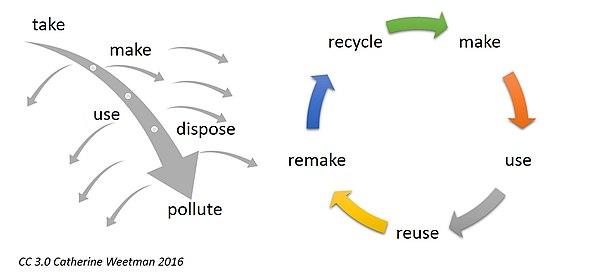Learning Path: The Circular Economy in Detail
The Ellen Macarthur Foundation is sponsoring a free, self-paced class on the circular economy, which they describe thus:
“A circular economy is a systemic approach to economic development designed to benefit businesses, society, and the environment. In contrast to the “take-make-waste” linear model, a circular economy is regenerative by design and aims to gradually decouple growth from the consumption of finite resources. After defining what an economy actually is, this learning path explores the nuances of the concept of a circular economy with text, videos, and interactive and reflective exercises. It probes the difference between biological and technical materials, the different opportunities that exist to keep materials and products in use, and the history of the idea.”
Super interesting material and great user interface–they both make a compelling case and make it easy to engage with the content. By the time you complete the reading, videos, and exercises, the benefits of shifting from a linear to a circular economy will be clear as will how they apply to all of the work we do as naturalists.
This opportunity is approved for CE credit for FMN members.
Check back regularly for links to additional resources from which you can learn more and, maybe, will want to review for us here. This subject is amazingly rich. Please share your thoughts and resources in comments and we’ll add them to this repo.
Hope Jahren: The Story of More: How We Got to Climate Change and Where We Go From Here. Honestly, the entire book is quotable, but here are some take-aways from one early Sunday morning: “An effort tempered by humility will go much further than one armored with righteousness…. We [scientists] are watching and working, not just worrying. Climate science is part of science after all…. Having hope requires courage. It matters how we talk about this. Everything we do matters.” (Consider starting with Appendix 1: The Action You Take, and then go dig into the data in the rest of the book.) By the way, she reads the audio book herself, and she’s a kind teacher.
Joel Onorato: Stop Going Round in Circles About the Circular Economy; also see his awesome presentation to the Sierra Club as pdf or live (along with the materials of the other panelists). “Keeping materials in use means preserving the maximum value of each thing that has been produced for the longest time possible. Reuse it as long as you can (give it to another user or share it). Repair it if you can’t reuse it as is. Or, if it has too little value, then remanufacture it (turn it back into something with an as-new condition). At worst, break it down and recycle each material (or compost it) for another future use.”
Rare’s Inspiring Human Nature: Tim Ma, Chef and Garbage Picker. “Tim Ma embraces his garbage. The famed Washington, DC-area chef and restaurateur is notorious for turning food trash into dinner treasure—which he does both for environmental sustainability and his bottom-line. ‘I don’t know how I became DC’s food waste champion,’ he laughs. ‘But I love talking about it.’” Meet someone who walks his talk.
Jonathan Safran Foer: We are the Weather: Saving the Planet Begins at Breakfast. The term circular economy never appears in this book because it’s about particular decisions we make and “our all-too-human reluctance to sacrifice immediate comfort for the sake of the future. We have, he reveals, turned our planet into a farm for growing animal products, and the consequences are catastrophic. Only collective action will save our home. And it all starts with what we eat—and don’t eat—for breakfast.” Please don’t let that stop you from considering his case and drawing your own insights. He wields data as effectively as Hope Jahren, and he tells a story just as compelling.




